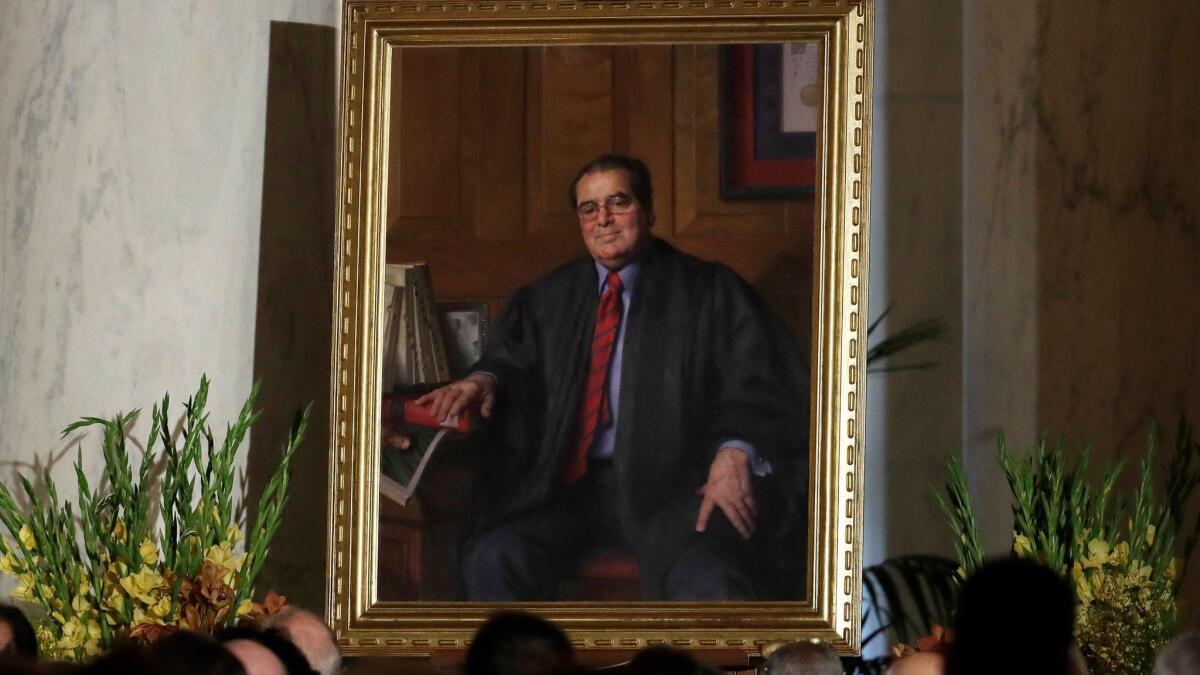Op-Ed: Mr. President, use a litmus test to choose your Supreme Court nominee

This week, President Trump will exercise one of the president’s most important powers: nominating someone to fill an empty seat on the Supreme Court. Many conservatives made peace with Trump because he promised to appoint “judges very much in the mold of Justice [Antonin] Scalia.” But will he have the mettle to keep his word or will he be cowed by Democratic Majority Leader Charles E. Schumer’s vow to only approve a “bipartisan” or “mainstream” nominee?
Early signs give conservatives reason to cheer. White House leaks have identified three federal appellate judges in the lead for the nomination: Neil M. Gorsuch of the 10th Circuit Court in Colorado, Thomas Hardiman of the 3rd Circuit Court in Pennsylvania, and William H. Pryor Jr. of the 11th Circuit in Alabama. George W. Bush, who selected the most conservative judges of any Republican president in memory, appointed all three.
Each of these candidates is under the age of 55; any of them could leave a Trumpian imprint on the Supreme Court for a generation. Each hails from outside the Beltway and the “elitist” Northeast corridor. They are all likely to appreciate the need for state checks on federal power and, hopefully, be well equipped to resist the siren songs of the D.C. cocktail circuit and the New York media.
The president should focus like a laser on judicial philosophy.
Pryor is probably the most conservative. He famously called Roe vs. Wade an “abomination” because it discovered a right to abortion in the 14th Amendment’s due process clause. A former Bush administration Department of Justice official, Gorsuch held that the free exercise clause in the 1st Amendment meant that the government couldn’t force Catholic nuns and religious companies to include birth control in their insurance plans. Hardiman, a less prominent conservative, voted against New Jersey’s tight limits on the open carry of firearms.
How should the president make his choice? It should have nothing to do with how a nominee fits in to Trump’s coterie of friends, family or admirers. A Supreme Court seat is not a bauble to hand out to chums or aides in the manner of a monarch granting titles to faithful servants. Nor should the president care if he hits it off with a candidate. Presidents spend no time with members of the court. George W. Bush reportedly asked one of his potential nominees, J. Harvie Wilkinson III, about his exercise routine. That is simply irrelevant.
Instead, the president should focus like a laser on judicial philosophy. Trump must nominate a justice based on his view of the proper interpretation of the Constitution. The oath he swore — to “preserve, protect and defend the Constitution of the United States” — means that just as he wouldn’t sign an unconstitutional bill, he must not nominate a judge who holds views at odds with the Constitution.
In giving “advice and consent,” senators should bring their constitutional judgment to bear as well. They are explicitly called on to serve as a check on the president’s views. As Alexander Hamilton wrote in the Federalist Papers: “The possibility of rejection would be a strong motive to care in proposing.”
In practical terms, Trump should reject nominees who pursue abstract concepts like “justice” and “fairness,” concepts that have been used by judges to smuggle their preferred policy preferences into the job of interpreting our founding document. The Constitution’s grant of judicial power does not create a continuing constitutional convention with Supreme Court justices as the sole delegates, able to add amendments at their whim. Of course judges must strike down legislation that violates the Constitution. But the court’s four reliable liberals, plus swing Justice Anthony M. Kennedy, often form a majority claiming that the Constitution enshrines a panoply of rights that, not coincidentally, mirror the policies favored by the left. Such decisions undercut our democracy.
The president should probe his candidates — and apply litmus tests. He and his aides should ask potential nominees to declare themselves on Roe vs. Wade, Citizens United (which struck down limits on campaign contributions as a violation of free speech) and McDonald vs.Chicago (which upheld an individual right to own firearms).
The answers will reveal the nominees’ theories of constitutional interpretation, their willingness to invent constitutional rights and their understanding of the judiciary’s role in our government. To keep his campaign promises, Trump must demand that his judges interpret the Constitution in accordance with original meaning, its historical context and the logic of its structure.
Fear of a confirmation fight shouldn’t steer the new president away from a constitutional conservative and toward a constitutional cipher. Otherwise he will have abandoned his duty to advance constitutional principles and surrendered to the status quo. That is no way to make America great again.
Saikrishna Prakash is a fellow at the Miller Center and law professor at the University of Virginia. John Yoo is a law professor at UC Berkeley and a visiting scholar at the American Enterprise Institute.
Follow the Opinion section on Twitter @latimesopinion and Facebook
MORE FROM OPINION
U.S. wants to have its immigration cake and eat it too
Trump did great this week (according to his supporters)
‘Calexit’ would be a disaster for progressive values
When it comes to Trump, liberals can’t see shades of gray
More to Read
A cure for the common opinion
Get thought-provoking perspectives with our weekly newsletter.
You may occasionally receive promotional content from the Los Angeles Times.










